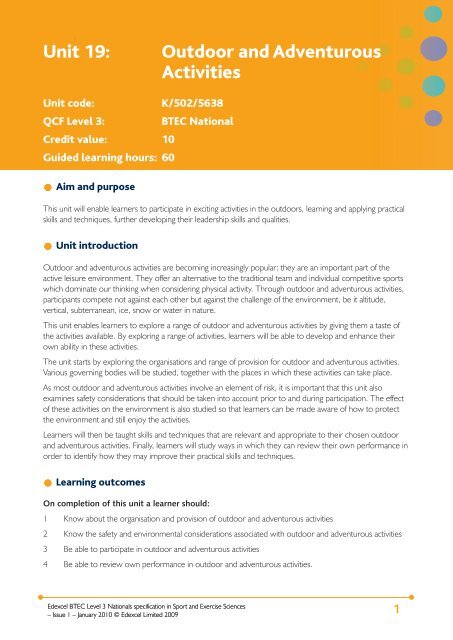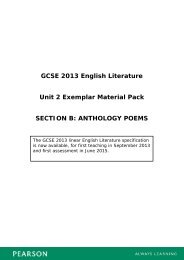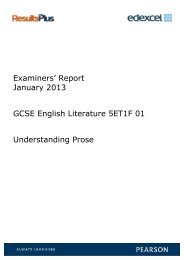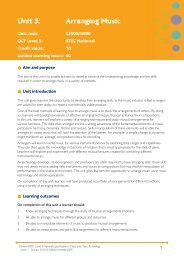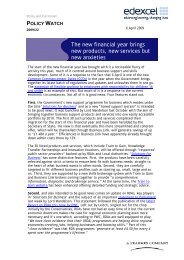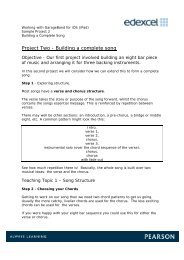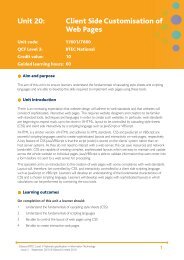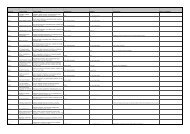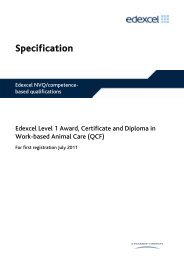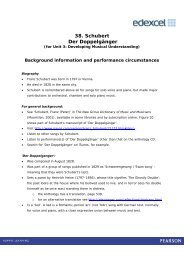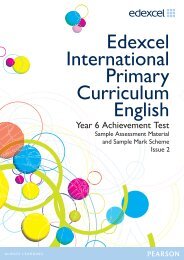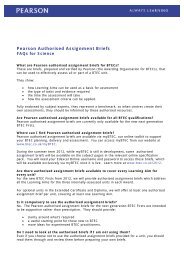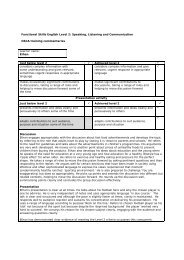Unit 19: Outdoor and Adventurous Activities - Edexcel
Unit 19: Outdoor and Adventurous Activities - Edexcel
Unit 19: Outdoor and Adventurous Activities - Edexcel
Create successful ePaper yourself
Turn your PDF publications into a flip-book with our unique Google optimized e-Paper software.
<strong>Unit</strong> <strong>19</strong>:<br />
<strong>Outdoor</strong> <strong>and</strong> <strong>Adventurous</strong><br />
<strong>Activities</strong><br />
<strong>Unit</strong> code:<br />
QCF Level 3:<br />
Credit value: 10<br />
Guided learning hours: 60<br />
Aim <strong>and</strong> purpose<br />
K/502/5638<br />
BTEC National<br />
This unit will enable learners to participate in exciting activities in the outdoors, learning <strong>and</strong> applying practical<br />
skills <strong>and</strong> techniques, further developing their leadership skills <strong>and</strong> qualities.<br />
<strong>Unit</strong> introduction<br />
<strong>Outdoor</strong> <strong>and</strong> adventurous activities are becoming increasingly popular; they are an important part of the<br />
active leisure environment. They offer an alternative to the traditional team <strong>and</strong> individual competitive sports<br />
which dominate our thinking when considering physical activity. Through outdoor <strong>and</strong> adventurous activities,<br />
participants compete not against each other but against the challenge of the environment, be it altitude,<br />
vertical, subterranean, ice, snow or water in nature.<br />
This unit enables learners to explore a range of outdoor <strong>and</strong> adventurous activities by giving them a taste of<br />
the activities available. By exploring a range of activities, learners will be able to develop <strong>and</strong> enhance their<br />
own ability in these activities.<br />
The unit starts by exploring the organisations <strong>and</strong> range of provision for outdoor <strong>and</strong> adventurous activities.<br />
Various governing bodies will be studied, together with the places in which these activities can take place.<br />
As most outdoor <strong>and</strong> adventurous activities involve an element of risk, it is important that this unit also<br />
examines safety considerations that should be taken into account prior to <strong>and</strong> during participation. The effect<br />
of these activities on the environment is also studied so that learners can be made aware of how to protect<br />
the environment <strong>and</strong> still enjoy the activities.<br />
Learners will then be taught skills <strong>and</strong> techniques that are relevant <strong>and</strong> appropriate to their chosen outdoor<br />
<strong>and</strong> adventurous activities. Finally, learners will study ways in which they can review their own performance in<br />
order to identify how they may improve their practical skills <strong>and</strong> techniques.<br />
Learning outcomes<br />
On completion of this unit a learner should:<br />
1 Know about the organisation <strong>and</strong> provision of outdoor <strong>and</strong> adventurous activities<br />
2 Know the safety <strong>and</strong> environmental considerations associated with outdoor <strong>and</strong> adventurous activities<br />
3 Be able to participate in outdoor <strong>and</strong> adventurous activities<br />
4 Be able to review own performance in outdoor <strong>and</strong> adventurous activities.<br />
<strong>Edexcel</strong> BTEC Level 3 Nationals specification in Sport <strong>and</strong> Exercise Sciences<br />
1<br />
– Issue 1 – January 2010 © <strong>Edexcel</strong> Limited 2009
<strong>Unit</strong> content<br />
1 Know about the organisation <strong>and</strong> provision of outdoor <strong>and</strong> adventurous activities<br />
<strong>Outdoor</strong> <strong>and</strong> adventurous activities: eg l<strong>and</strong>-based (rock climbing, mountain walking, skiing, snow boarding,<br />
orienteering, caving), water-based (kayaking, windsurfing, sailing, canoeing, surfing), air-based (paragliding,<br />
parascending, gliding, parachuting)<br />
Organisation <strong>and</strong> provision: governing bodies, eg British Canoe Union (BCU), Royal Yachting Association<br />
(RYA), British Surfing Association (BSA), British Gliding Association (BGA), Mountain Leader Training<br />
UK (MLTUK), British Orienteering Federation (BOF), British Mountaineering Council (BMC), British<br />
Association of Ski Instructors (BASI), British Caving Association (BCA); statutory bodies, eg Countryside<br />
Agency, National Parks, Civil Aviation Authority (CAA); voluntary bodies, eg The Ramblers Association,<br />
climbing <strong>and</strong> mountaineering clubs, canoeing <strong>and</strong> kayaking clubs; education, eg local education authority<br />
outdoor centres, mountain <strong>and</strong> water centres eg Outward Bound centres<br />
2 Know the safety <strong>and</strong> environmental considerations associated with outdoor <strong>and</strong><br />
adventurous activities<br />
Safety considerations: risk assessments; emergency procedures, eg rescue, first aid, distress signals,<br />
contacting emergency services, protecting rest of group; personal protective equipment<br />
Environmental considerations: eg flora, fauna, wildlife (respect, preservation <strong>and</strong> conservation), national<br />
nature reserves, guidelines <strong>and</strong> legislation (countryside code, Countryside Rights of Way Act 2000<br />
– CRoW)<br />
3 Be able to participate in outdoor <strong>and</strong> adventurous activities<br />
Skills <strong>and</strong> techniques: eg l<strong>and</strong>-based activities (knots, belaying, route planning, navigation, pacing,<br />
traversing), water-based activities (stroke, capsize drills, manoeuvring, efficient h<strong>and</strong>ling of craft), air-based<br />
activities (effective h<strong>and</strong>ling of controls, take-off, l<strong>and</strong>ing, navigation), use of equipment (wet suit, buoyancy<br />
aid, boots, boat)<br />
4 Be able to review own performance in outdoor <strong>and</strong> adventurous activities<br />
Review: feedback, eg peers, leaders, observers; self-evaluation; recording, eg log, diary<br />
Development plan: SMART (specific, measurable, achievable, realistic, time-bound) targets; aims;<br />
objectives; opportunities, eg training, qualifications; possible barriers<br />
2<br />
<strong>Edexcel</strong> BTEC Level 3 Nationals specification in Sport <strong>and</strong> Exercise Sciences<br />
– Issue 1 – January 2010 © <strong>Edexcel</strong> Limited 2009
Assessment <strong>and</strong> grading criteria<br />
In order to pass this unit, the evidence that the learner presents for assessment needs to demonstrate that<br />
they can meet all the learning outcomes for the unit. The assessment criteria for a pass grade describe the<br />
level of achievement required to pass this unit.<br />
Assessment <strong>and</strong> grading criteria<br />
To achieve a pass grade the<br />
evidence must show that the<br />
learner is able to:<br />
P1<br />
P2<br />
P3<br />
P4<br />
P5<br />
P6<br />
describe four different<br />
outdoor <strong>and</strong> adventurous<br />
activities, including their<br />
organisation <strong>and</strong> provision<br />
describe safety considerations<br />
associated with four different<br />
outdoor <strong>and</strong> adventurous<br />
activities<br />
describe environmental<br />
considerations associated<br />
with four different outdoor<br />
<strong>and</strong> adventurous activities<br />
demonstrate appropriate<br />
skills <strong>and</strong> techniques in<br />
two different outdoor <strong>and</strong><br />
adventurous activities, with<br />
tutor support<br />
[RL1, RL2, RL3, TW1, TW3,<br />
TW5]<br />
carry out a review of own<br />
performance in outdoor<br />
<strong>and</strong> adventurous activities,<br />
identifying strengths <strong>and</strong> areas<br />
for improvement<br />
[IE1, IE4, RL5, SM2, EP4]<br />
design a development<br />
plan for improving own<br />
performance in outdoor <strong>and</strong><br />
adventurous activities.<br />
[IE1, IE4, RL5, SM2, SM6,<br />
EP3]<br />
To achieve a merit grade the<br />
evidence must show that, in<br />
addition to the pass criteria,<br />
the learner is able to:<br />
M1 explain safety considerations<br />
associated with four different<br />
outdoor <strong>and</strong> adventurous<br />
activities<br />
M2 explain environmental<br />
considerations associated<br />
with four different outdoor<br />
<strong>and</strong> adventurous activities<br />
M3 independently demonstrate<br />
appropriate skills <strong>and</strong><br />
techniques in two different<br />
outdoor <strong>and</strong> adventurous<br />
activities<br />
M4 explain identified strengths<br />
<strong>and</strong> areas for improvement in<br />
own performance in outdoor<br />
<strong>and</strong> adventurous activities,<br />
<strong>and</strong> explain suggestions<br />
relating to development.<br />
To achieve a distinction grade<br />
the evidence must show that,<br />
in addition to the pass <strong>and</strong><br />
merit criteria, the learner is<br />
able to:<br />
D1<br />
D2<br />
evaluate the safety <strong>and</strong><br />
environmental considerations<br />
associated with four different<br />
outdoor <strong>and</strong> adventurous<br />
activities<br />
justify suggestions made<br />
relating to the development<br />
plan.<br />
<strong>Edexcel</strong> BTEC Level 3 Nationals specification in Sport <strong>and</strong> Exercise Sciences<br />
– Issue 1 – January 2010 © <strong>Edexcel</strong> Limited 2009<br />
3
PLTS: This summary references where applicable, in the square brackets, the elements of the personal,<br />
learning <strong>and</strong> thinking skills applicable in the pass criteria. It identifies opportunities for learners to demonstrate<br />
effective application of the referenced elements of the skills.<br />
Key<br />
IE – independent enquirers<br />
RL – reflective learners<br />
SM – self-managers<br />
CT – creative thinkers<br />
TW – team workers<br />
EP – effective participators<br />
4<br />
<strong>Edexcel</strong> BTEC Level 3 Nationals specification in Sport <strong>and</strong> Exercise Sciences<br />
– Issue 1 – January 2010 © <strong>Edexcel</strong> Limited 2009
Essential guidance for tutors<br />
Delivery<br />
During the delivery of this unit learners should be given as much practical experience as possible. If the<br />
centre does not have outdoor <strong>and</strong> adventurous activity provision, it may be possible to cover part or all of<br />
this unit on an outdoor pursuits residential trip or through a series of day trips to outdoor pursuits centres or<br />
providers.<br />
The first part of the unit is primarily theory-based; organisations <strong>and</strong> the provision of outdoor <strong>and</strong> adventurous<br />
activities are explored. A range of providers should be covered, with a more in-depth focus on the main<br />
providers <strong>and</strong> organisations for the activities intended for their learners. Tutors could take learners on trips to<br />
visit some of the providers of these activities, such as local education authority outdoor activity centres, local<br />
authority outdoor development units or private outdoor providers. Visits from freelance outdoor instructors<br />
will give learners a personal insight into the structure of the industry.<br />
Safety considerations that are specific to outdoor <strong>and</strong> adventurous activities should be covered. Learners<br />
should be taught about general safety considerations, such as risk assessments, first aid box content <strong>and</strong><br />
emergency procedures, then carry out a study of activity-specific safety considerations.<br />
Environmental impact can be covered through a mix of theory <strong>and</strong> practical work. For example, the<br />
countryside code could be taught together with conservation of wildlife, which is then followed by a walk in<br />
the country where learners can put this theory into practice.<br />
Skills <strong>and</strong> techniques for l<strong>and</strong>-based, water-based or air-based activities should be taught as practically as<br />
possible. A minimum of two suitable activities should be covered.<br />
Practical participation may be possible via other routes; for example, if the learner is a member of the air<br />
cadets then participation in an air-based activity may be possible. Appropriate witness testimony must be<br />
produced.<br />
To complete the unit, learners can monitor <strong>and</strong> review their performance through the completion of<br />
logbooks or feedback from their tutor. They can then research courses that are available for them to improve<br />
their performance.<br />
<strong>Edexcel</strong> BTEC Level 3 Nationals specification in Sport <strong>and</strong> Exercise Sciences<br />
– Issue 1 – January 2010 © <strong>Edexcel</strong> Limited 2009<br />
5
Outline learning plan<br />
The outline learning plan has been included in this unit as guidance <strong>and</strong> can be used in conjunction with the<br />
programme of suggested assignments.<br />
The outline learning plan demonstrates one way in planning the delivery <strong>and</strong> assessment of this unit.<br />
Topic <strong>and</strong> suggested assignments/activities <strong>and</strong>/assessment<br />
Tutor introduction <strong>and</strong> overview of unit.<br />
Assignment 1: <strong>Outdoor</strong> <strong>and</strong> <strong>Adventurous</strong> <strong>Activities</strong>: Organisation <strong>and</strong> Provision (P1). Tutor introduces<br />
the assignment brief.<br />
Tutor to lead on the investigation <strong>and</strong> description of four different types of outdoor <strong>and</strong> adventurous activities.<br />
Examination of the organisation <strong>and</strong> provision of the four activities. Includes learner research tasks.<br />
Learners to explore different types of outdoor <strong>and</strong> adventurous activities – practical activities.<br />
Tutor to lead practical outdoor <strong>and</strong> adventurous activity experience to examine the differing activities.<br />
Tutor to lead practical outdoor <strong>and</strong> adventurous activity experience.<br />
Tutor to lead practical outdoor <strong>and</strong> adventurous activity experience.<br />
Tutor to lead in exploring the influence of safety considerations on practical outdoor <strong>and</strong> adventurous activities.<br />
Assignment 2: Safety Considerations (P2, M1). Tutor introduces the assignment brief.<br />
Learners to explain influence of safety considerations on practical outdoor <strong>and</strong> adventurous activities. Group<br />
discussions.<br />
Tutor to lead practical outdoor <strong>and</strong> adventurous activity experience.<br />
Tutor to lead evaluation of environmental considerations: impact <strong>and</strong> influence on practical outdoor <strong>and</strong><br />
adventurous activities. Assignment 3: Environmental Considerations (P3, M2, D1). Tutor introduces the<br />
assignment brief.<br />
Learners to categorise <strong>and</strong> explain environmental considerations <strong>and</strong> how these impact <strong>and</strong> influence practical<br />
outdoor <strong>and</strong> adventurous activities.<br />
Learners to give personal demonstration of practical outdoor <strong>and</strong> adventurous activity skills. Practical observation<br />
<strong>and</strong> assessment. Assignment 4: Practical Participation (P4, M3). Tutor introduces the assignment brief.<br />
Learners to give personal demonstration of practical outdoor <strong>and</strong> adventurous activity skills. Practical observation<br />
<strong>and</strong> assessment.<br />
Learners to review personal performance in practical outdoor <strong>and</strong> adventurous activities. Assignment 5:<br />
Review of Own Performance (P5, P6, M4, D2). Tutor introduces the assignment brief.<br />
Learners to produce development plan for own improvement in outdoor <strong>and</strong> adventurous activities.<br />
Review of unit. Outst<strong>and</strong>ing work catch-up workshop.<br />
6<br />
<strong>Edexcel</strong> BTEC Level 3 Nationals specification in Sport <strong>and</strong> Exercise Sciences<br />
– Issue 1 – January 2010 © <strong>Edexcel</strong> Limited 2009
Assessment<br />
For P1, learners must choose four different outdoor <strong>and</strong> adventurous activities <strong>and</strong> describe what the activities<br />
involve. They must also describe the organisations that run these activities, such as the governing bodies <strong>and</strong><br />
also the provision for these activities. Learners may select all l<strong>and</strong>-based, or all water-based, or all air-based,<br />
or a selection of any four activities.<br />
For P2, learners should investigate safety considerations for four different outdoor <strong>and</strong> adventurous activities<br />
of their choice. They should be able to produce risk assessments for each activity, be able to describe relevant<br />
emergency procedures for each activity <strong>and</strong> describe personal protective equipment required for each activity.<br />
Criteria P1 <strong>and</strong> P2 can be assessed through learners carrying out their own research <strong>and</strong> producing a written<br />
report.<br />
For P3, learners should select four different outdoor <strong>and</strong> adventurous activities of their choice <strong>and</strong> describe<br />
how these activities impact on the relevant environment.<br />
It would be a good idea for learners to use the same four outdoor <strong>and</strong> adventurous activities throughout<br />
criteria P1, P2 <strong>and</strong> P3 so that a good underst<strong>and</strong>ing can be gained of each activity.<br />
For P4, learners must be able to demonstrate appropriate practical skills <strong>and</strong> techniques for two different<br />
outdoor <strong>and</strong> adventurous activities of their choice, with tutor support. For example, an instructor may be in<br />
the water to assist learners as they demonstrate a capsize drill. This could be assessed through observation<br />
records or learners may participate in a relevant governing body award scheme. Tutor witness statements<br />
<strong>and</strong>/or observation records must link clearly to the assessment <strong>and</strong> grading criteria <strong>and</strong> associated <strong>Unit</strong><br />
content.<br />
For P5, learners must examine their own practical performance in the two outdoor <strong>and</strong> adventurous activities<br />
through a mix of self-assessment, peer assessment <strong>and</strong> instructor assessment. From this, learners should be<br />
able to identify their strengths <strong>and</strong> also ways in which they may improve their practical skills. For P6, learners<br />
will build on their review of their personal performance in two practical outdoor <strong>and</strong> adventurous activities by<br />
producing a development plan which will identify how they can improve their performance.<br />
For M1, learners should explain safety considerations for four different outdoor <strong>and</strong> adventurous activities of<br />
their choice – this includes discussing why each safety consideration is in place <strong>and</strong> the purpose it serves.<br />
For M2, learners should select four different outdoor <strong>and</strong> adventurous activities of their choice <strong>and</strong> explain<br />
how these activities impact on the relevant environment around them <strong>and</strong> ways in which they may minimise<br />
this impact.<br />
For M3, learners must be able to independently demonstrate appropriate practical skills <strong>and</strong> techniques for<br />
two different outdoor <strong>and</strong> adventurous activities of their choice. For P4 <strong>and</strong> M3, a detailed observation record<br />
<strong>and</strong>/or witness statement should be completed by the tutor which highlights skills <strong>and</strong> techniques that learners<br />
have completed well <strong>and</strong> also areas for improvement. The observation record should clearly document<br />
criteria Met/Not Met. It would also be possible to assess these criteria through a personal proficiency award<br />
from an appropriate governing body or by instructor feedback.<br />
For M4, learners must examine their own practical performance in the two outdoor <strong>and</strong> adventurous<br />
activities. From this, learners should be able to explain their strengths <strong>and</strong> methods by which they may<br />
improve their skills such as researching training courses or relevant clubs they may join.<br />
For D1, learners need to be able to evaluate the safety <strong>and</strong> environmental considerations for four outdoor<br />
<strong>and</strong> adventurous activities. Learners should determine whether there are some risks not accounted for <strong>and</strong><br />
whether further controls need to be introduced to further minimise risk of hazards causing harm. They should<br />
also evaluate the environmental impact of each of these activities <strong>and</strong> provide suggestions regarding how this<br />
impact may be decreased.<br />
<strong>Edexcel</strong> BTEC Level 3 Nationals specification in Sport <strong>and</strong> Exercise Sciences<br />
– Issue 1 – January 2010 © <strong>Edexcel</strong> Limited 2009<br />
7
For D2, learners need to justify the suggestions that they have made regarding their own development plan<br />
for improvement.<br />
Learners should complete a logbook or diary to record their participation in the activities together with a plan<br />
of how they propose to develop their performance.<br />
Programme of suggested assignments<br />
The table below shows a programme of suggested assignments that cover the pass, merit <strong>and</strong> distinction<br />
criteria in the assessment <strong>and</strong> grading grid. This is for guidance <strong>and</strong> it is recommended that centres either<br />
write their own assignments or adapt any <strong>Edexcel</strong> assignments to meet local needs <strong>and</strong> resources.<br />
Criteria covered Assignment title Scenario Assessment method<br />
P1<br />
<strong>Outdoor</strong> <strong>and</strong><br />
<strong>Adventurous</strong> <strong>Activities</strong>:<br />
Organisation <strong>and</strong><br />
Provision<br />
You have gained a work<br />
placement at an outdoor<br />
education centre. Describe<br />
four outdoor <strong>and</strong> adventurous<br />
activities, what they involve,<br />
organisations that run these<br />
activities <strong>and</strong> also the provision<br />
for these activities.<br />
P2, M1 Safety Considerations The centre regularly carries out<br />
risk assessments. Know how to<br />
carry out risk assessments <strong>and</strong><br />
how to apply them to different<br />
activities.<br />
P3, M2, D1 Environmental<br />
Considerations<br />
During the placement<br />
you practically explore<br />
environmental considerations<br />
during participation in outdoor<br />
<strong>and</strong> adventurous activities.<br />
P4, M3 Practical Participation Demonstrate practical skills<br />
<strong>and</strong> techniques in two different<br />
outdoor <strong>and</strong> adventurous<br />
activities.<br />
P5, P6, M4, D2 Review of Own<br />
Performance<br />
Self-reflect on performance in<br />
practical activities <strong>and</strong> design a<br />
development plan.<br />
Written report.<br />
Written risk assessments.<br />
Written report.<br />
Practical observation <strong>and</strong><br />
assessment.<br />
Witness statement/observation<br />
record.<br />
Presentation.<br />
Witness statement.<br />
8<br />
<strong>Edexcel</strong> BTEC Level 3 Nationals specification in Sport <strong>and</strong> Exercise Sciences<br />
– Issue 1 – January 2010 © <strong>Edexcel</strong> Limited 2009
Links to National Occupational St<strong>and</strong>ards, other BTEC units, other BTEC<br />
qualifications <strong>and</strong> other relevant units <strong>and</strong> qualifications<br />
This unit forms part of the BTEC Sport sector suite <strong>and</strong> the BTEC Sport <strong>and</strong> Exercise Sciences sector suite.<br />
This unit has particular links with the following unit titles in the BTEC Sport suite <strong>and</strong> the BTEC Sport <strong>and</strong><br />
Exercise Sciences suite:<br />
Level 2 Sport Level 3 Sport Level 3 Sport <strong>and</strong> Exercise<br />
<strong>Activities</strong><br />
Expedition Experience Practical Individual Sports Practical Individual Sports<br />
Leading <strong>Outdoor</strong> <strong>and</strong> <strong>Adventurous</strong><br />
<strong>Activities</strong><br />
<strong>Outdoor</strong> <strong>and</strong> <strong>Adventurous</strong><br />
<strong>Activities</strong><br />
Skills for L<strong>and</strong>-based <strong>Outdoor</strong> <strong>and</strong><br />
<strong>Adventurous</strong> <strong>Activities</strong><br />
Skills for Water-based <strong>Outdoor</strong> <strong>and</strong><br />
<strong>Adventurous</strong> <strong>Activities</strong><br />
Leading L<strong>and</strong>-based <strong>Outdoor</strong> <strong>and</strong><br />
<strong>Adventurous</strong> <strong>Activities</strong><br />
Leading Water-based <strong>Outdoor</strong> <strong>and</strong><br />
<strong>Adventurous</strong> <strong>Activities</strong><br />
Equipment <strong>and</strong> Facilities for<br />
<strong>Outdoor</strong> <strong>and</strong> <strong>Adventurous</strong> <strong>Activities</strong><br />
Impact <strong>and</strong> Sustainability in <strong>Outdoor</strong><br />
Adventure<br />
Environmental Education for<br />
<strong>Outdoor</strong> Adventure<br />
Alternative Pursuits for <strong>Outdoor</strong><br />
Adventure<br />
Assessing Risk in Sport<br />
This unit links with the National Occupational St<strong>and</strong>ards (NOS) for:<br />
●<br />
<strong>Outdoor</strong> Education, Development Training <strong>and</strong> Recreation at Level 3.<br />
Essential resources<br />
To deliver this unit effectively centres will need a range of specialist outdoor equipment, to include personal<br />
protective equipment such as waterproofs, helmets <strong>and</strong> wetsuits as well as specialist activity equipment such<br />
as ropes <strong>and</strong> kayaks. Alternatively, centres need to be located within close proximity to the ‘great outdoors’<br />
<strong>and</strong> have access to outdoor centres which can provide the specialist equipment <strong>and</strong> knowledge.<br />
Employer engagement <strong>and</strong> vocational contexts<br />
This unit focuses on the safe practical participation in outdoor <strong>and</strong> adventurous activities <strong>and</strong> the impact such<br />
participation has on the environment <strong>and</strong> participants. It also examines the organisations which exist within the<br />
outdoor industry. The unit gives learners the personal skills they need to become good practitioners in the<br />
outdoors <strong>and</strong> helps them to acquire the personal experience required to enrol on the National Governing<br />
Body qualification structures which exist in the outdoor industry. Centres are encouraged to visit outdoor<br />
centres <strong>and</strong> to invite outdoor professionals to visit the centre to give talks on the industry.<br />
<strong>Edexcel</strong> BTEC Level 3 Nationals specification in Sport <strong>and</strong> Exercise Sciences<br />
– Issue 1 – January 2010 © <strong>Edexcel</strong> Limited 2009<br />
9
Indicative reading for learners<br />
Textbooks<br />
Barton B – Safety Risk <strong>and</strong> Adventure in <strong>Outdoor</strong> <strong>Activities</strong> (Paul Chapman Publishing, 2006)<br />
ISBN 9781412920780<br />
Cox D – The Sailing H<strong>and</strong>book (New Holl<strong>and</strong> Publishers, 2007) ISBN 9781845377526<br />
Duff J <strong>and</strong> Gormly P – First Aid <strong>and</strong> Wilderness Medicine (Cicerone Press, 2007) ISBN 9781852845001<br />
Ferrero F – British Canoe Union: Coaching H<strong>and</strong>book (PESDA, 2006) ISBN: 9780954706166<br />
Foster N – Open Canoe Technique (Globe Pequot Press, 2003) ISBN 9781898660262<br />
Hill P – The Complete Guide to Climbing <strong>and</strong> Mountaineering (David <strong>and</strong> Charles, 2008)<br />
ISBN 9780715328422<br />
Long S – Hill Walking (The Mountain Training Trust UK, 2003) ISBN 9780954151102<br />
Martin B, Cashel C, Wagstaff M <strong>and</strong> Breunig M – <strong>Outdoor</strong> Leadership: Theory <strong>and</strong> Practice (Human Kinetics,<br />
2006) ISBN 9780736057318<br />
Journals<br />
Canoe Focus<br />
Climber<br />
Summit<br />
The Great <strong>Outdoor</strong>s<br />
Websites<br />
British Canoe Union<br />
British Mountaineering Council<br />
The Ramblers Association<br />
Royal Yachting Association<br />
www.bcu.org<br />
www.thebmc.co.uk<br />
www.ramblers.org.uk<br />
www.rya.org<br />
10<br />
<strong>Edexcel</strong> BTEC Level 3 Nationals specification in Sport <strong>and</strong> Exercise Sciences<br />
– Issue 1 – January 2010 © <strong>Edexcel</strong> Limited 2009
Delivery of personal, learning <strong>and</strong> thinking skills<br />
The table below identifies the opportunities for personal, learning <strong>and</strong> thinking skills (PLTS) that have been<br />
included within the pass assessment criteria of this unit.<br />
Skill<br />
Independent enquirers<br />
Creative thinkers<br />
Reflective learners<br />
Team workers<br />
Self-managers<br />
Effective participators<br />
When learners are …<br />
carrying out a review of own performance in outdoor <strong>and</strong> adventurous activities,<br />
identifying strengths <strong>and</strong> areas for improvement<br />
designing a development plan for improving own performance in outdoor <strong>and</strong><br />
adventurous activities<br />
demonstrating appropriate skills <strong>and</strong> techniques in two different outdoor <strong>and</strong><br />
adventurous activities, with tutor support<br />
demonstrating appropriate skills <strong>and</strong> techniques in two different outdoor <strong>and</strong><br />
adventurous activities, with tutor support<br />
carrying out a review of own performance in outdoor <strong>and</strong> adventurous activities,<br />
identifying strengths <strong>and</strong> areas for improvement<br />
designing a development plan for improving own performance in outdoor <strong>and</strong><br />
adventurous activities<br />
demonstrating appropriate skills <strong>and</strong> techniques in two different outdoor <strong>and</strong><br />
adventurous activities, with tutor support<br />
carrying out a review of own performance in outdoor <strong>and</strong> adventurous activities,<br />
identifying strengths <strong>and</strong> areas for improvement<br />
designing a development plan for improving own performance in outdoor <strong>and</strong><br />
adventurous activities<br />
carrying out a review of own performance in outdoor <strong>and</strong> adventurous activities,<br />
identifying strengths <strong>and</strong> areas for improvement<br />
designing a development plan for improving own performance in outdoor <strong>and</strong><br />
adventurous activities.<br />
Although PLTS are identified within this unit as an inherent part of the assessment criteria, there are further<br />
opportunities to develop a range of PLTS through various approaches to teaching <strong>and</strong> learning.<br />
Skill<br />
Independent enquirers<br />
Creative thinkers<br />
Reflective learners<br />
Team workers<br />
Self-managers<br />
When learners are …<br />
researching different outdoor <strong>and</strong> adventurous activities<br />
discussing the ethics involved in participation in outdoor <strong>and</strong> adventurous activities<br />
finding new solutions to overcome problems during practical participation<br />
observing each other during practical assessment<br />
assisting others during practical participation in outdoor <strong>and</strong> adventurous activities<br />
seeking new physical challenges <strong>and</strong> setting personal goals.<br />
<strong>Edexcel</strong> BTEC Level 3 Nationals specification in Sport <strong>and</strong> Exercise Sciences<br />
– Issue 1 – January 2010 © <strong>Edexcel</strong> Limited 2009<br />
11
Functional Skills – Level 2<br />
Skill<br />
ICT – Use ICT systems<br />
Select, interact with <strong>and</strong> use ICT systems<br />
independently for a complex task to meet a<br />
variety of needs<br />
Use ICT to effectively plan work <strong>and</strong><br />
evaluate the effectiveness of the ICT system<br />
they have used<br />
ICT – Develop, present <strong>and</strong><br />
communicate information<br />
Enter, develop <strong>and</strong> format information<br />
independently to suit its meaning <strong>and</strong><br />
purpose including:<br />
●<br />
●<br />
●<br />
●<br />
text <strong>and</strong> tables<br />
images<br />
numbers<br />
records<br />
Present information in ways that are fit for<br />
purpose <strong>and</strong> audience<br />
Select <strong>and</strong> use ICT to communicate <strong>and</strong><br />
exchange information safely, responsibly <strong>and</strong><br />
effectively including storage of messages <strong>and</strong><br />
contact lists<br />
English<br />
Speaking <strong>and</strong> listening – make a range of<br />
contributions to discussions <strong>and</strong> make<br />
effective presentations in a wide range of<br />
contexts<br />
Reading – compare, select, read <strong>and</strong><br />
underst<strong>and</strong> texts <strong>and</strong> use them to gather<br />
information, ideas, arguments <strong>and</strong> opinions<br />
Writing – write documents, including<br />
extended writing pieces, communicating<br />
information, ideas <strong>and</strong> opinions, effectively<br />
<strong>and</strong> persuasively<br />
When learners are …<br />
researching <strong>and</strong> reporting on the different types of outdoor <strong>and</strong><br />
adventurous activities<br />
producing a personal development plan<br />
writing risk assessments<br />
carrying out <strong>and</strong> writing a risk assessment<br />
producing a personal development plan<br />
developing <strong>and</strong> using evaluation forms<br />
carrying out <strong>and</strong> writing a risk assessment<br />
developing <strong>and</strong> using evaluation forms<br />
producing a personal development plan<br />
developing <strong>and</strong> using evaluation forms<br />
completing risk assessments<br />
reviewing own performance<br />
gathering information on the different types of outdoor <strong>and</strong><br />
adventurous activities<br />
completing risk assessments<br />
gathering information on the different types of outdoor <strong>and</strong><br />
adventurous activities<br />
completing risk assessments<br />
reviewing own performance.<br />
12<br />
<strong>Edexcel</strong> BTEC Level 3 Nationals specification in Sport <strong>and</strong> Exercise Sciences<br />
– Issue 1 – January 2010 © <strong>Edexcel</strong> Limited 2009


